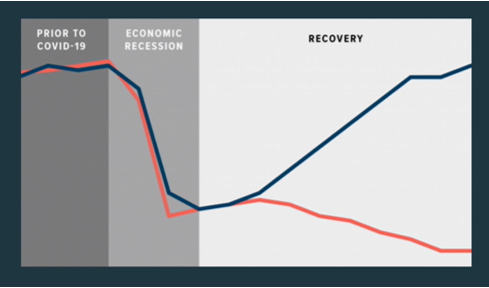

Speaking at the first panel session of the lender’s SME Insights Series, GetCapital CEO Jamie Osborn addressed the current state of Australia’s small businesses, how he anticipates the pullback of government stimulus to transpire, and what the head of Australia’s peak professional body for commercial brokers foresees for the sector’s future.
Osborn started by establishing SMEs’ current cash balances are actually “about double” what they were in February of this year, before any impact of the pandemic was yet felt.
“Of course, you’ve got JobKeeper, you’ve got loan deferrals, you’ve got rent deferrals – all of these support mechanisms which will unwind and we’ll see some erosion of those cash buffers,” Osborn said.
“I think it’s good to see that buildup in cash buffer, but I want to emphasise it’s not homogenous across the grid.”
Osborn explained a “massive divergence” has been charted in terms of both the performance and cash balances of certain sectors, and even individual businesses within the same sectors in some instances.
“We talk about this being a K-shaped recovery, not a V, not a U, not an L,” he said.
“There’s an upper arm of that K, with businesses doing incredibly well; unfortunately, there’s a lower arm, with some businesses having been decimated…frankly, it’s all in front of us in terms of getting that transition from that government support back to a self-sustaining environment; that’s going to be absolutely critical.”

According to Osborn, consumer demand will be the key to the success of SMEs’ transition from government support through to self-sustenance.
“We’ve got this great budget that just landed with a whole heap of stimulus in there, which I think is a great thing, but there’s a couple of things that have to happen for that to take hold,” Osborn said.
“One is, we need to get line of sight on the health issue. People need to understand how we come out of this from a health perspective. Secondly, we’ve got to get passed things like lockdowns. If we can do that, and we get some confidence back in the market, then with all the fuel that’s been put on the fire – with the budget, what the RBA is doing and saying they’ll do – then I’m pretty confident the demand side of that will come.”
David Gandolfo, president of the Commercial Asset Finance Brokers Association of Australia (CAFBA), also participated in the panel, weighing in to explain that current market conditions are leading to the scope of the role the broker plays evolving “in a way”.
“This plays to the broker market. At CAFBA, we represent the commercial market. But even in the home loan market, you need an advocate. There are so many options out there, and there are so many parameters around them,” he said.
“In the proprietary channel, your business banker typically has a fairly short tenure in the role they’re in. They have a shallow depth of knowledge of a wide range of products. They’re there to sell you products.
“The broker’s role to source and have a knowledge of a wide range of products in the commercial space has absolutely come to the fore,” he finished.
